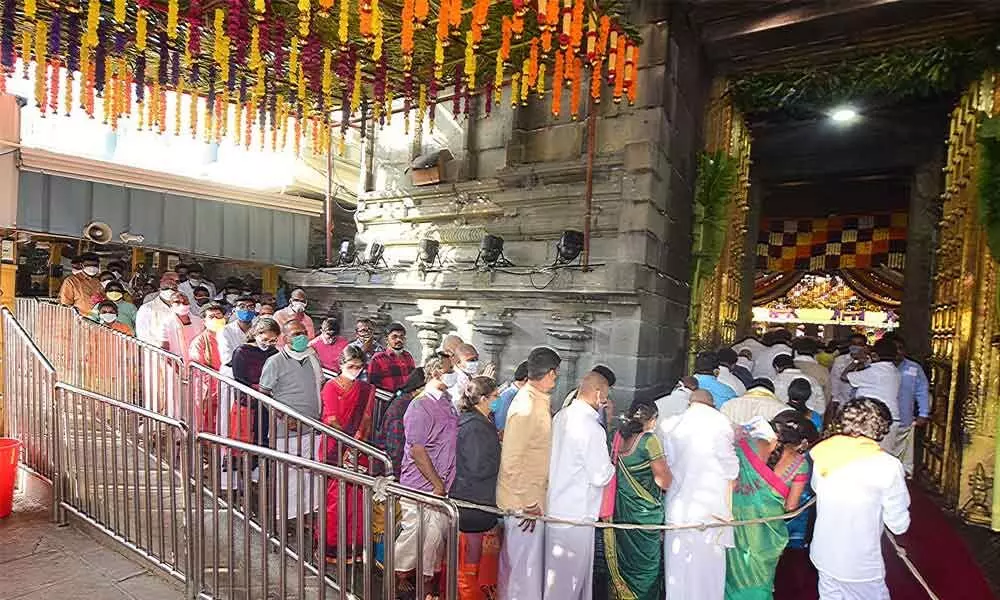


At least six people were killed and 40 others injured in a tragic stampede at the famous Lord Venkateswara Swamy temple in Tirupati, India. The incident happened during the rush for tickets to the annual Vaikunta Dwara Darshanam, which is known to attract a massive crowd every year. The injured are receiving treatment and leaders, including the Prime Minister Narendra Modi, have expressed their condolences and are closely monitoring the situation.
Tragic Stampede at Tirupati Temple: Background and Aftermath
On January 3, 2023, a horrific stampede at the Lord Venkateswara Swamy temple in Tirupati, India, claimed the lives of six pilgrims and left 40 others injured. The incident occurred during a chaotic rush for tickets to the annual Vaikunta Dwara Darshanam, a highly popular pilgrimage event.
Background
The Tirupati temple is one of the most revered temples in India, attracting millions of devotees each year. The Vaikunta Dwara Darshanam is a 20-day festival that culminates in the opening of the Vaikunta Dwara, a special gate in the temple. Pilgrims believe that entering through this gate during this time brings good fortune and salvation.
The Stampede
On January 3, a large crowd gathered at the temple premises to purchase tickets for the Vaikunta Dwara Darshanam. As the line became crowded and impatient, a stampede broke out. According to witnesses, some pilgrims fell and were trampled by the surging crowd.
Aftermath
The incident sent shockwaves through India and the global Hindu community. Prime Minister Narendra Modi expressed his condolences to the families of the deceased and ordered an immediate investigation. The injured were rushed to nearby hospitals, where they are receiving treatment.
FAQs
1. What caused the stampede?
The stampede was primarily caused by the massive crowd and inadequate crowd management. The number of pilgrims exceeded the capacity of the temple premises, leading to overcrowding and confusion.
2. Why was the crowd so large?
The Vaikunta Dwara Darshanam is a highly auspicious event, and thousands of pilgrims from all over India travel to Tirupati to participate. The limited number of tickets available for the event further contributed to the large crowd.
3. What steps are being taken to prevent future incidents?
The Tirupati temple authorities have announced plans to improve crowd management measures, including increasing the number of ticket counters and widening the pathways leading to the temple. They are also considering introducing online ticket booking to reduce overcrowding.
4. Have there been similar incidents in the past?
Unfortunately, this is not the first stampede to occur at the Tirupati temple. In 1995, a stampede claimed the lives of 28 pilgrims. In 1974, a stampede killed 13 people.
5. What is the government's response to the incident?
The Indian government has ordered an inquiry into the stampede and has promised to provide financial assistance to the victims and their families. Prime Minister Modi has appealed for calm and advised pilgrims to prioritize their safety.

Indonesian President Prabowo Subianto was a special guest at India's 76th Republic-Day celebrations at Kartavya Path. This marked the second time an Indonesian President graced this event, with the first being 75 years ago. Accompanied by a delegation of six cabinet ministers and senior officials, Subianto witnessed a grand military parade and cultural performances, as well as brought a 352-member marching and band contingent from Indonesia.

Iran's foreign minister has announced that a prisoner swap deal with France is close to being finalized. The agreement would secure the release of Iranian nationals imprisoned in France and allow for the return of French citizens detained in Iran. This development comes as Germany announces its support for a French-led effort to establish a two-state solution in the Middle East.

Qatar's prime minister has accused Israeli Prime Minister Benjamin Netanyahu of destroying months of mediation efforts to secure a ceasefire deal and free remaining hostages in Gaza. With the lives of 20 hostages at risk, Qatar had been working with the US and Egypt to broker a deal, but Tuesday's attack on Hamas' leadership in Doha has killed any hope for a resolution. Despite Trump's promises that such an attack will not be repeated, Netanyahu continues to threaten Qatar, accusing them of harboring terrorists and vowing to take action if they don't comply.

In a shocking development, Israel has launched an attack on Hamas leaders in the Qatari capital, Doha, resulting in the deaths of six people. The Qatari government has condemned the attack as "state terrorism" and has raised questions about Israel's true intentions in the region. The attack ruptures the delicate ceasefire negotiations in Gaza, where Qatar has been acting as a mediator. This latest incident highlights the increasing involvement of Qatar in the volatile conflicts in the Middle East.

Israel's strikes on Yemen's capital come amidst warnings from their defence minister and public disapproval from Donald Trump following their attack on Doha. As the Middle East watches the tense situation unfold, Qatar struggles to recover from the unprecedented assault on their sovereign territory. A senior Qatari government member expresses anger and concern over the US's delayed warning of the attack, further complicating the already tense relations in the region.

Amid ongoing protests and the resignation of Prime Minister KP Sharma Oli, Nepal has appointed former Chief Justice Sushila Karki as the country's interim head. The death toll in the protests has risen to 25, with hundreds more injured. As the Nepali Army takes over security responsibilities, flights have resumed at the international airport and authorities are cautioning against the spread of misinformation on social media.

After two days of violent protests, Nepal Army Chief General Ashok Raj Sigdel successfully persuaded former Chief Justice Sushila Karki to become the interim Chief Executive of the country. This comes after the Gen Z protests and other groups reached a consensus with political parties to restore normalcy and form an interim government. The Nepal Army, for the first time, has stepped in to quell the chaos and bring diverse political forces together for dialogue.

Days of deadly protests in Nepal have led to the overthrow of KP Sharma Oli's government and the appointment of Sushila Karki as interim prime minister. Karki, the former chief justice, has expressed positivity towards India and its people, citing personal ties from her time studying in India. She assures the safety of Indians in Nepal and promises justice for those affected by the recent violence. Meanwhile, Nepalese troops are working to restore order and bring the country back to normalcy.

In a fiery speech at the 60th Session of the UN Human Rights Council, Indian diplomat Kshitij Tyagi slammed Switzerland for its "shallow and ill-informed remarks" on India's state of press and minorities. Tyagi called on Switzerland, as the current chair of the UNHRC, to focus on tackling its own challenges such as racism and xenophobia instead of pointing fingers at India. He also delivered a sharp rebuttal to Pakistan, labelling it as a "failed state" addicted to propaganda and terror. India, Tyagi underscored, will continue to protect its citizens and defend its sovereignty with unwavering resolve.

Protests against corruption in Kathmandu, Nepal took a destructive turn as the iconic Hilton Hotel was set on fire, leaving behind a charred skeleton of its once grand glass facade. The protests also included attacks on government buildings and political leaders' residences, causing chaos throughout the city. The destruction of the Hilton Hotel is significant as it represents Nepal's aspirations for growth in the hospitality industry, with social media users expressing fear for the country's future.